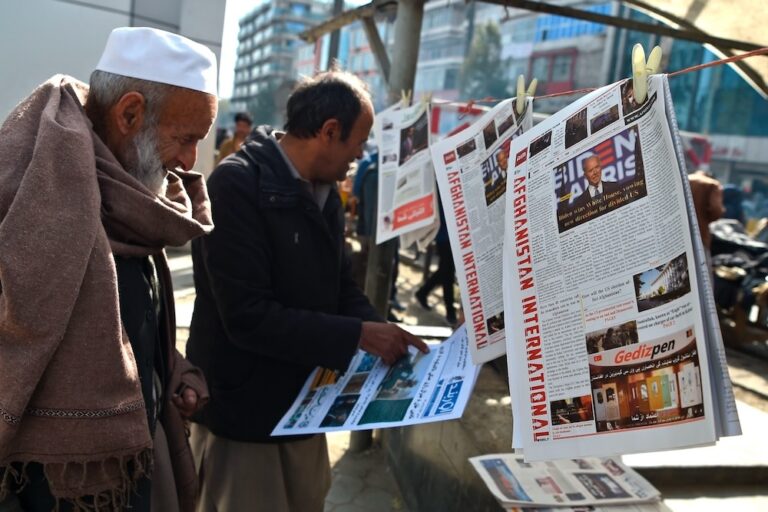The Afghanistan Journalists Center said that the media should be free to use the national and official languages or the native languages of the country.
This statement was originally published on afjc.media on 18 January 2024.
Mullah Khairullah Khairkhah, Acting Minister of Information and Culture of the Taliban, recently issued a letter urging the media to refrain from using “foreign terms” in order to protect the country’s “national identity.” The letter also emphasized the importance of preserving religious, moral, and social values, requesting radio and television stations to broadcast the five calls to prayer and respect Islamic occasions, including Ramadan.
AFJC has obtained a copy of this letter, which highlights the importance of stability, preservation, and promotion of national and official languages [Persian/Dari, Pashto], as well as media activities in accordance with the country’s Mass Media law. The letter is expected to be officially sent to private media organizations.
In this letter, Khairullah Khairkhah said that national and official languages are a sign of the national identity of any country, and for the survival and stability of any nation, it is necessary to preserve its language and culture. He said: “The Ministry of Information and Culture, for the purpose of survival, durability, enrichment, development and safe protection of the national and official languages, hopes that all the country’s media in their programs, interviews, news, comments and writings, Avoid the terms, words and expressions of other languages and consider the principles, rules and grammar of their national and official languages so that the languages of the country remain immune from the interference, influence and influence of foreign languages.”
It is worth noting that the Ministry of Information, Culture, and the General Directorate of Intelligence(GDI) Intelligence has summoned and pressured several media officials in recent months regarding their use of national languages.
Emphasizing the importance of the country’s national and native languages in maintaining cultural diversity and promoting inclusiveness and communication, AFJC firmly supports media rights and freedom of expression, which includes how to use different languages and dialects. “We warn against applying restrictions that can hinder the media’s ability to produce content and communicate effectively with audiences, or create restrictions for journalists in producing programs or reporting freely and accurately. It is vital that the media are free to use the national and official languages or the native languages of the country in accordance with the relevant language regulations, and any kind of actions and pressure in this regard is against the country’s Mass Media law and is considered interference in the work of free media.
According to the fourth article of Afghanistan’s Mass Media law, no individual or authority can prohibit, sanction, censor, or restrict the free activities of news or information media or interfere with their publications.

The Deputy of Publication at the Ministry of Information and Culture of the Taliban has confirmed to the AFJC that the letter from the Taliban’s Minister of Information and Culture, dated December 9, 2023, will be officially sent to media outlets.
Furthermore, in the letter, the Acting Ministry of Information and Culture of the Taliban government stated that while all the mass media in the country operate under the jurisdiction of the Ministry of Information and Culture, as mandated by the law governing public media, it is mandatory for them to comply with the 20th and 25th articles of this law. The 20th article stipulates that private radio and television stations must observe the principles and orders of Islam, as well as the national, spiritual, moral values, and psychological security of the Afghan nation in their programs. The 25th article requires electronic media managers to include religious and moral issues, health, environment, the significance of education, and the harms of drug cultivation, production, and consumption in their educational programs. The second paragraph of this article obliges media managers to broadcast the five calls to prayer and respect Islamic holy days and the month of Ramadan in their program schedule.
Khairkhah’s letter does not mention other articles of the Media Law or the fate of the proposed amendment to this law. In September 2023, Hayatullah Mohajer Farahi, the Deputy of Publication at the Ministry of Information and Culture of the Taliban, made an announcement regarding the completion of a proposal aimed at amending the Media Law and the Access to Information Law. This proposal was subsequently submitted to the Taliban leadership in Kandahar for their consideration and approval.
However, a research study conducted by AFJC has shown that the Taliban have implemented at least 14 directives that run parallel to these laws. Despite not being issued by a single authority or following proper legal procedures, these directives have greatly restricted journalists’ and media outlets’ freedom to work and are considered the basis of the Taliban government’s media policy.



